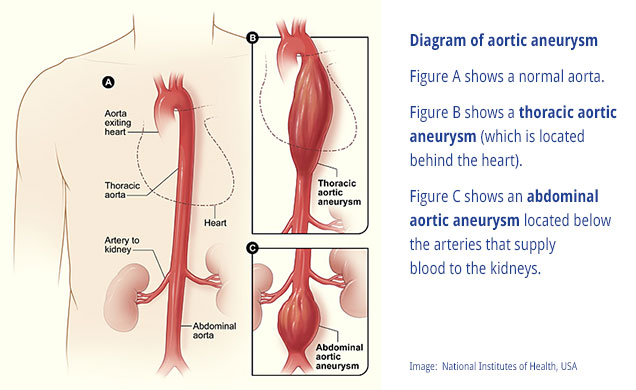AAA - FAQs

What is AAA?
AAA is a disease that occurs when the walls of the aorta, the body's largest blood vessel, weaken and expand. The larger the aneurysm, the more apt it is to burst, creating a potentially fatal situation — only two in ten people survive, with most dying before they reach a hospital. They are most common in men aged over 65. An AAA rupture accounts for more than 2% of all male deaths in this age group.
What's the risk?
In England and Wales, there are around 6,000 deaths each year from a rupture (bursting) of an abdominal aortic aneurysm. The vast majority are men - the condition is SIX times more common in men than women. Around 4% of men aged between 65 and 74 (that's about 80,000 men) in England have an AAA. It is a serious disease, which, if undetected and untreated, could prove to be life-threatening.
Apart from being male and over 60, the main risk factors for AAA are smoking, high blood pressure and a family history of the diseases. All the risks for heart disease more generally, really. So talk to the men in your family.
What are the symptoms?
The AAA itself causes no noticeable symptoms and is not of itself particularly dangerous. The problems arise if it bursts. This causes severe internal bleeding and, as we have said, is often fatal. The main symptom of rupture is sudden, severe pain in the chest. If you suspect that you or someone else has had a ruptured aneurysm, call 999 immediately and ask for an ambulance.
What about screening?
The NHS provides AAA screening. You should be invited for this during the course of your 65th year. If you're over 65 and haven't been invited, ask your GP about it.
The screening involves a very simple ultrasound scan - the sort women have during pregnancy - that takes about ten minutes.
The NHS AAA Screening Programme aims to reduce deaths from ruptured AAA amongst men aged 65 and over by up to 50%
Does it work?
The BMJ published an analysis of the 10-year Multicentre Aneurysm Screening Study (MASS) data which showed that the NHS AAA Screening Programme was effective. The NHS says it 'will prevent significant numbers of AAA ruptures and AAA deaths'.
What will happen if screening detects an AAA?
If you're detected with an AAA which hasn't ruptured, then what doctors will suggest usually depends on its size.
If it's large (over 5.5cm), you'll probably be advised to have surgery to strengthen the weakened aorta or to replace it with a synthetic material.
If you have a smaller AAA, you'll be monitored with regular scans.
Surgery is not offered automatically because there is always some risk with surgery. If you can't or don't want surgery, treatment will focus on preventing the AAA rupturing by lowering blood pressure and cholesterol levels and eliminating lifestyle risks such as smoking.
Date published
24/10/14
Date of last review
24/10/14
Date of next review
24/10/17
References
|
The Men’s Health Forum need your support It’s tough for men to ask for help but if you don’t ask when you need it, things generally only get worse. So we’re asking. In the UK, one man in five dies before the age of 65. If we had health policies and services that better reflected the needs of the whole population, it might not be like that. But it is. Policies and services and indeed men have been like this for a long time and they don’t change overnight just because we want them to. It’s true that the UK’s men don’t have it bad compared to some other groups. We’re not asking you to ‘feel sorry’ for men or put them first. We’re talking here about something more complicated, something that falls outside the traditional charity fund-raising model of ‘doing something for those less fortunate than ourselves’. That model raises money but it seldom changes much. We’re talking about changing the way we look at the world. There is nothing inevitable about premature male death. Services accessible to all, a population better informed. These would benefit everyone - rich and poor, young and old, male and female - and that’s what we’re campaigning for. We’re not asking you to look at images of pity, we’re just asking you to look around at the society you live in, at the men you know and at the families with sons, fathers and grandads missing. Here’s our fund-raising page - please chip in if you can. |


